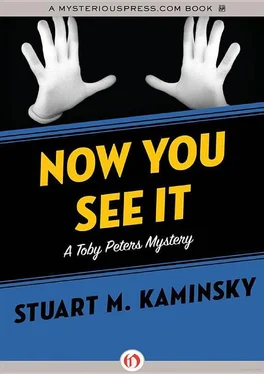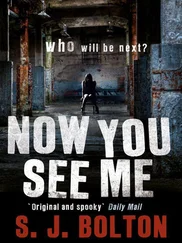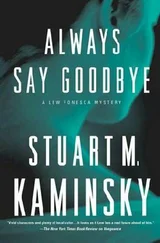Stuart Kaminsky - Now You See It
Здесь есть возможность читать онлайн «Stuart Kaminsky - Now You See It» весь текст электронной книги совершенно бесплатно (целиком полную версию без сокращений). В некоторых случаях можно слушать аудио, скачать через торрент в формате fb2 и присутствует краткое содержание. Жанр: Криминальный детектив, на английском языке. Описание произведения, (предисловие) а так же отзывы посетителей доступны на портале библиотеки ЛибКат.
- Название:Now You See It
- Автор:
- Жанр:
- Год:неизвестен
- ISBN:нет данных
- Рейтинг книги:3 / 5. Голосов: 1
-
Избранное:Добавить в избранное
- Отзывы:
-
Ваша оценка:
- 60
- 1
- 2
- 3
- 4
- 5
Now You See It: краткое содержание, описание и аннотация
Предлагаем к чтению аннотацию, описание, краткое содержание или предисловие (зависит от того, что написал сам автор книги «Now You See It»). Если вы не нашли необходимую информацию о книге — напишите в комментариях, мы постараемся отыскать её.
Now You See It — читать онлайн бесплатно полную книгу (весь текст) целиком
Ниже представлен текст книги, разбитый по страницам. Система сохранения места последней прочитанной страницы, позволяет с удобством читать онлайн бесплатно книгу «Now You See It», без необходимости каждый раз заново искать на чём Вы остановились. Поставьте закладку, и сможете в любой момент перейти на страницу, на которой закончили чтение.
Интервал:
Закладка:
I found a Bill Stern sports report on the radio. Bucky Walters of the Reds was on his way to winning 30 games. A bunch of pitchers looked like they were going to win 20 including George Munger of the Cards, Bill Voiselle of the Giants, Rip Sewell of the Pirates, Ted Hughson of the Red Sox, Hank Borowy of the Yankees, Hal Newhouser of the Tigers, and Bill Detrich of the White Sox. It was a pitcher’s season.
There was a parking space right in front of Mrs. Plaut’s. It was small, but so was the Crosley. I hadn’t picked up a parking ticket in almost two years, which is quite an accomplishment given the Los Angeles traffic regulations that seemed to be designed to guarantee an unlimited source of revenue from drivers who couldn’t keep it all straight.
The Los Angeles speed limit was twenty miles an hour in business districts, twenty-five miles an hour in residential districts. Right turns were permitted against the red from the right-hand lane after a full stop, but pedestrians and vehicles proceeding with a signal had the right of way. There was no parking along red or yellow curbs, three-minute parking along white curbs, fifteen-minute parking at green curbs. Along unmarked curbs, you could park for forty-five minutes in the Central Traffic District from seven in the morning till four-thirty in the afternoon, but there was no parking in the district from four-thirty to six p.m. Parking was unlimited from six p.m. till two a.m. From two to four a.m. there was a thirty-minute parking limit, but parking was unlimited from four till seven a.m.
Having parked legally, I plucked at my moist shirt as I walked up the sidewalk to the porch where Mrs. Plaut, tiny, thin, ancient and determined, sat on the porch swing, a pencil in one hand, and a pad of lined paper in the other. That meant one of two things, neither of which boded well for me. She was either working on her family history, which was now several thousand pages long or she was doing a grocery list.
If it were the history, I would soon be getting a pile of neatly written pages to read and approve. Mrs. Plaut, more than a little hard of hearing and often in audio contact with a world the rest of us couldn’t hear, believed that I was two things, a book editor and an exterminator. She did not think the combination odd and had once told me that the long-gone Mr. Plaut had once been a prospector, stagecoach driver, and tree surgeon at the same time.
If she were working on her grocery list, it would mean a trip to the nearest Ralph’s, which I didn’t mind. What I minded was the mind-numbing explanation of the rationing system, which Mrs. Plaut had mastered and I was expected to remember.
“Mr. Peelers,” she said, looking up at me.
I had long ago decided not to correct her.
“It is I,” I said.
“I was going to give you this list this evening, but as luck would have it, here you are.”
“Here I am, as luck would have it,” I said. “I need a shower and a change of clothes.”
She looked at me and said,
“You need a shower and a change of clothes.”
“I’ll do that.”
“Shopping list,” she said, handing me the sheet she had been working on. I didn’t look at it.
“We’re having beef heart stew tonight, if you can do the shopping this afternoon.”
“I’ll do the shopping this afternoon,” I said.
She reached into the crocheted purse next to the wooden chair and came up with three one-dollar bills, which she handed to me along with the dreaded ration coupon book.
I looked at the list:
Beef hearts, two lbs.
40 cents
20 oz. loaf, bread
10 cents
Hot dogs, one lb.
19 cents
Ritz crackers, one lb.
19 cents
Armour’s Treet, 12-oz. can
27 cents
Super Suds, large
23 cents
Cuticura skin ointment
37 cents
Squibb Aspirin (200)
69 cents
Miracle Whip 16 oz.
19 cents
“The Cuticura is a necessity,” she said. “My hands.”
“I’m sure,” I agreed.
In truth, Mrs. Plaut did have delicate hands and long fingers.
“The ration calendar,” she said.
The dreaded ration calendar. There was no escape so I simply listened, mind growing numb.
“Processed food,” she said, without reference to notes. “Blue A8 through V8, book 4, is now valid at 10 points each for use with tokens. You understand?”
“Perfectly,” I said.
“W8, X8, Y8, Z8, and A5 became good July 2.”
“Got it,” I said. “Anything else?”
“Meats and fats,” she said. “Red A8 through W8, book 4, are now valid at 10 points each for use with tokens, of course.”
“Of course,” I agreed.
“And you should know, Mr. Peelers, that A-10 coupons are now valid for gasoline. Rationing rules now require every car owner to write his license number and state on all gas coupons in his possession as soon as they are issued to him. And here.”
She handed me about thirty additional sheets of lined paper.
“A chapter about Wooley in England,” she said.
“Wooley?”
“My second eldest brother, now deceased,” she said, with a shake of her head to indicate that this was information I should have possessed. “I would appreciate your reading it this night.”
“May I take a shower and change now?” I asked.
“You won’t need any change,” she said. “The three dollars will be quite enough.”
I didn’t answer. I went inside and headed for the steps. On my left were Mrs. Plaut’s rooms. Inside, her caged bird was screeching. She changed the name of the bird with cycles of the planets, the changing of the tides, the fortunes of war, the sudden emergence of long-forgotten friends. The current name of the bird, she had informed us at dinner the night before, was Admiral Nelson. It was as certain to change by breakfast tomorrow, as it was that Dewey would get the Republican nomination for president.
On my left was the parlor, decorated in the latest furniture and fashion of the year right after the Civil War.
I went up the steps and to my room where I put Mrs. Plaut’s grocery list, coupons, and the chapter of her book on the small table near the window. Then I took off my shirt, selected another one that seemed to have no missing buttons and was reasonably clean, and headed for the bathroom down the hall. Stripped, door secured by the flimsy hook and little eye, I showered and sang A Little On The Lonely Side , at least the words I could remember.
When I finished, I headed back toward my room pausing at the door of Gunther Wherthman, my closest friend, who stood less than four feet tall and carried himself with a dignity that should have been the envy of every slouching congressman.
I knocked. Gunther called for me to come in. The door wasn’t locked. No doors at Mrs. Plaut’s were allowed to be locked. Privacy, she believed, nurtured the possibility of perversion.
Gunther’s room was the same size as mine, but that’s where the comparison ended. My room looked like a messy college freshman’s dorm closet. A worn sofa against one wall, a dresser near the door, a small table with two chairs. A box of a refrigerator the size of a peach crate, and a mattress against the wall. The mattress plopped down on the floor at night and so did I. My back is ever on the verge of rebellion and needs a firm thin mattress and the promise that I will never sleep on my stomach or side.
Gunther’s room had a neatly made-up single bed in the corner with a muted multicolored Indian blanket over it and matching pillows on top. There was a single soft brown leather armchair, a dark Persian throw rug on the floor, dark wooden bookshelves against the walls, and a desk near the window with neat piles of paper, magazines, reports, and books. In the swivel chair by the desk, Gunther sat wearing, as he always did, a three-piece suit and tie. Gunther worked in his room as a translator for industry and the government. He always dressed for work.
Читать дальшеИнтервал:
Закладка:
Похожие книги на «Now You See It»
Представляем Вашему вниманию похожие книги на «Now You See It» списком для выбора. Мы отобрали схожую по названию и смыслу литературу в надежде предоставить читателям больше вариантов отыскать новые, интересные, ещё непрочитанные произведения.
Обсуждение, отзывы о книге «Now You See It» и просто собственные мнения читателей. Оставьте ваши комментарии, напишите, что Вы думаете о произведении, его смысле или главных героях. Укажите что конкретно понравилось, а что нет, и почему Вы так считаете.












